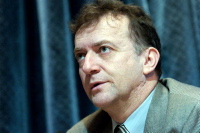Q:
A:
Year of successful European and international integrations for Serbia
Belgrade,
28 December 2005
Assistant Minister of International Economic Relations Dusko Lopandic said that 2005 has been a very successful year for Serbia when it comes to European and international integrations, and recalled that this year Serbia also began talks on joining the World Trade Organisation.
At a press conference of the Belgrade Centre for European Integration (BeCEI), Lopandic pointed out that Serbia has had positive economic indicators this year, such as export growth of around 33 percent, and a rise in foreign direct investment of around 50 percent, while the exports-to-imports ratio was a little over 40 percent, up from the previous 30 percent, which will facilitate future negotiations with international organisations concerning trade liberalisation.
He said that one of the criteria for EU accession is market economy, and to achieve it Serbia must develop its economic capacities, which means it needs institutional integration.
"It is therefore necessary that Serbia concludes a new multilateral agreement with countries in the region to replace a welter of current free trade agreements and define the rules of cross-border trade", he said and voiced hope that foreign investment will double in 2006 and that export will rise from 30 to 40 percent.
According to Lopandic, this will facilitate the negotiating process concerning market liberalisation, which should help create a European level of competitiveness in the domestic market.
After the first technical round of talks with the EU, more negotiations await Serbia in 2006, such as talks on agriculture that will require limitations in subsidies and customs, and even a complete abolishing of customs in certain sectors, said Lopandic.
Director of the Serbian government’s EU Integration Office Tanja Miscevic said that complete cooperation with the tribunal in The Hague is the first precondition for unhindered talks on the Stabilisation and Association Agreement (SAA) with the EU.
Miscevic pointed out that there are currently no indications of any suspension of these talks, but that at last week's meeting of the Western Balkans Committee it was said that it is necessary for Serbia to improve cooperation with the tribunal as soon as possible.
She said that when it comes to talks on the SAA, one of the key issues is the redefining of relations within the state union, because if Montenegro decides to separate that can cause a delay in the negotiating process and provide the EU with an opportunity to make further political conditions and protract the talks.
According to Miscevic, talks on the future status of Kosovo-Metohija are not directly connected with talks on the SAA, though a productive approach in the former negotiating process will give Serbia a better position in the talks with the EU.
Serbia is technically thoroughly prepared for the talks, which has been confirmed by the EU, she said.
Miscevic announced that there is a possibility that the EU redefines its enlargement policy, which could be disconcerting for Serbia because some EU countries believe that Western Balkan countries should first be given an intermediate position before full membership. Thus, the candidate countries would learn about the integration process and get ready for EU entry.
She stressed that Serbia must do its best so that there is no redefining of the EU enlargement policy, and that relations in the Western Balkans are not a condition for EU entry.
He said that one of the criteria for EU accession is market economy, and to achieve it Serbia must develop its economic capacities, which means it needs institutional integration.
"It is therefore necessary that Serbia concludes a new multilateral agreement with countries in the region to replace a welter of current free trade agreements and define the rules of cross-border trade", he said and voiced hope that foreign investment will double in 2006 and that export will rise from 30 to 40 percent.
According to Lopandic, this will facilitate the negotiating process concerning market liberalisation, which should help create a European level of competitiveness in the domestic market.
After the first technical round of talks with the EU, more negotiations await Serbia in 2006, such as talks on agriculture that will require limitations in subsidies and customs, and even a complete abolishing of customs in certain sectors, said Lopandic.
Director of the Serbian government’s EU Integration Office Tanja Miscevic said that complete cooperation with the tribunal in The Hague is the first precondition for unhindered talks on the Stabilisation and Association Agreement (SAA) with the EU.
Miscevic pointed out that there are currently no indications of any suspension of these talks, but that at last week's meeting of the Western Balkans Committee it was said that it is necessary for Serbia to improve cooperation with the tribunal as soon as possible.
She said that when it comes to talks on the SAA, one of the key issues is the redefining of relations within the state union, because if Montenegro decides to separate that can cause a delay in the negotiating process and provide the EU with an opportunity to make further political conditions and protract the talks.
According to Miscevic, talks on the future status of Kosovo-Metohija are not directly connected with talks on the SAA, though a productive approach in the former negotiating process will give Serbia a better position in the talks with the EU.
Serbia is technically thoroughly prepared for the talks, which has been confirmed by the EU, she said.
Miscevic announced that there is a possibility that the EU redefines its enlargement policy, which could be disconcerting for Serbia because some EU countries believe that Western Balkan countries should first be given an intermediate position before full membership. Thus, the candidate countries would learn about the integration process and get ready for EU entry.
She stressed that Serbia must do its best so that there is no redefining of the EU enlargement policy, and that relations in the Western Balkans are not a condition for EU entry.











